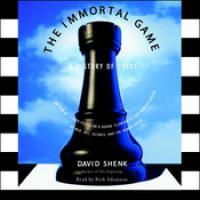
Chess Book Review - The Immortal Game by David Shenk
The Immortal Game by David Shenk
A book review by: Yvette Fannell @chesspoet
‘Understanding is the essential weapon,’ proclaims the ancient Persian poem “Chatrang-namak,” one of the oldest books mentioning the game. ‘Victory is obtained by the intellect...’
The Immortal Game: A History of Chess, or How 32 Carved Pieces on a Board Illuminated Our Understanding of War, Art, Science, and the Human Brain by David Shenk explores the impact chess has on the world over its fifteen hundred-plus years in existence. Even if you are not into chess, or do not understand chess, Shenk crafts the book in a way that makes it equally interesting for players and non-players alike to understand and gain an appreciation for the history of this important game.
Chess, a game, an art, a course of study, has been used as a model to illustrate ideas that served to advance the creativity and knowledge in many fields. Shenk refers to chess as a precursor to presentation software. Chess’ intellectual impact on the world is vast and makes its mark in most areas of study: mathematics, science, war strategy, religion, cognitive development, artificial intelligence, and creative writing, are just to name a few. A game of symbolic representation, and pattern recognition; chess, becomes an international language of expression unto itself, akin to both literacy and numeracy.
Much to the delight of chessheads, Shenk artfully weaves a game into the narrative of the book. June 21, 1851 in London, Adolf Anderssen vs. Lionel Kieseritzky:
Two of my favorite chapters in this book, chapters seven and eight, deal with the chess and its impact on the human brain. Like two sides of a coin, chapter seven, “Chess and the Working Mind,” speaks to chess as a mental exercise, and its impact on cognitive studies of the brain, the next, “Chess and the Shattered Mind,” attempts to explore the idea that too much chess, in the cases of Bobby Fischer and Paul Morphy among others, can become a compulsion that provides an escape from troubled and tragic lives.
A favorite game played by many historical icons and intellectuals such as Muhammad, Pythagoras, Thomas Jefferson, Stanley Kubrik, and Will Smith, The Immortal Game lends us some insight into chess as an important exercise for some of our most influential, creative, and accomplished minds. Queen Isabella and her husband King Ferdinand of Spain were avid chess players. It’s not a coincidence that it was during the fifteen and sixteenth centuries, a period of powerful queens in Europe, that “the queen” in chess expanded her territory from moving diagonally one square at a time to reigning the entire board.
If you love chess this book is a must-read. Understanding how chess has evolved and impacted the world for over fifteen hundred years will give any player a deeper understanding, appreciation, and mastery of the game. After all, understanding is the essential weapon. # @chesspoet
David Shenk is a national bestselling author of four previous books, including The Forgetting and Data Smog, and a contributor to National Geographic, Gourmet, Harper’s, The New Yorker, NPR, and PBS. The Forgetting was hailed by John Bayley as “the definitive work on Alzheimer’s,” and subsequently inspired an Emmy Award—winning PBS film of the same name. Shenk frequently lectures on issues of health, aging, and technology, and has advised the President’s Council on Bioethics. He lives in Brooklyn, New York. [Shenk bio is copied from The Immortal Game book jacket published by Double Day © 2006]